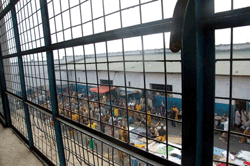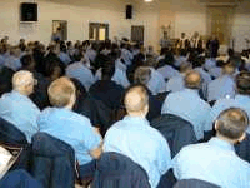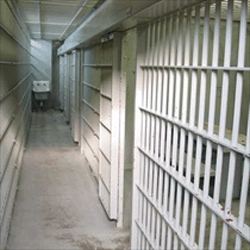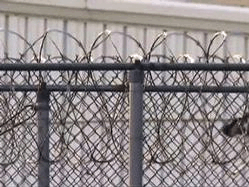Approximately 25,000 ex-offenders enter back into Ohio each year, and 2,100 in Summit County.
With no job, no home and burned bridges with family, the odds are against these people, causing many to re-offend and return to prison. Others just aren't caught.
The question is, what are we as a society doing to reach out to these people while they are still in prison, before they get released? Will working with them while they are inside of the jail and prison systems create an inward change that will show once they are released?
Ministries such as Broken Chains and The Way Out jail and prison ministries work with men and women while incarcerated, in hopes to build lasting relationships that continue once they are released. Their goal is to get them plugged into churches and communities with accountability so that they are less likely to fall into the old patterns and behaviors that landed them in jail in the first place.
But, as we've been hard hit by the economy, so have they.

Effects of Economic Cutbacks
Who knew the downward spiraling economy would affect those in prison? In September of 2009, 35 deputies and inmate service workers who oversaw all of the programming inside of the Summit County Jail were laid off.
"Since then, we've had 5 people doing the work of 18," Dennis Shawhan, Executive Director of Broken Chains and Chaplain at the Summit County Jail, said.
This put a halt to Broken Chains Sunday night chapel services and the library, recreation, AA, and NA, they all disappeared because there were no longer any deputies available to supervise evening visitation.
"There have been positives and negatives that have come out of this," Shawhan said, "But the thing that hurts the most is the relationships that were forged with the churches in the area."

Bringing the Church to Prison
Previously, 22 churches came into the jail on a rotational basis, bringing their worship teams to give the inmates a taste of different church experiences.
"We were allowing inmates to take a look at all of the different churches around Summit County," Shawhan said.
This offered them a variety of churches to experience in order to decide where they'd like to connect when getting out of jail.
"Then, when the churches couldn't come in anymore they just disappeared," Shawhan said.
The layoffs also affected their mentors who are no longer able to come in during the daytime visiting hours because most of them work during the day. They lost 13 out of the 20 mentors that came in regularly.

Separation in Families
Visitation hours in the jail used to go until 8:00 at night and doors were opened on weekends.
"Now families can no longer visit their loved ones on the weekend,' Shawhan said.
Visitation is only 8-11 a.m. and 1-3 p.m. on weekdays now.
"That's the only visitation, so if you work you can't visit people. There's nothing on weekends," Shawhan explained, "The economy has had a major impact on family reunification."
Now, it is Broken Chains that comes in and establishes relationships with the inmates. They are able to share the gospel because there are state mandated requirements for religious services in the jails.

Overseers
With all of the layoffs, there weren't many people left to oversee the programs, which is why they were cut.
Then Broken Chains stepped in.
Now substance abuse programs and many others have been started up again by the Chaplains themselves.
Each Chaplain is assigned a housing unit. Chaplains now run church services as well.
Inmates used to be offered 3 Chapel services on Sunday evenings for men and 2 for women. This brought in close to 400 people, out of the nearly 700 in the jail.
"They were able to hear the Gospel and be encouraged from the Word of God to be changed," Shawhan said.
Now there is a maximum of 24 in each service.
"And with maximum security rarely do we even get 24. It's usually 15 or 20 people," Shawhan said, "But what that's caused is closer knit relationships."

Christian Library
On another positive note, although there is no longer a prison library, Broken Chains has had the opportunity to introduce a Christian library.
"The library that was there was run by the county and was all secular," Shawhan said.
Books on Witchcraft and violent topics filled the shelves, but Christian books did not.
"We weren't able to bring in Christian books because of security issues," Shawhan explained, "So that's when we asked about starting our own library."
They were given a room and the library began to grow.
Their most popular books are the Left Behind series.
"Instead of reading secular books, all of these Christian authors are being read and people are hungry to read them. That's what's caused us to form deeper relationships with people we might have never met before," he continued.
Whenever an inmate is done with one book they must put in a request for another, meeting the Chaplains face to face.
The women love books that tell real life stories.
"They want to see Christianity in action, not just doctrine and theology, but they want to see how to live it out," Shawhan shared.

When One Door Shuts…
In the midst of all the cutbacks, God seems to be moving with miracles of open doors of opportunity.
Broken Chains now has the opportunity to work with the Oriana House, an alternative sentencing for many inmates leaving the Summit County Jail. This Community Based Correctional Facility (CBCF) is now allowing church teams that once visited the jail to have church at their facility.
"Now the Oriana House is getting chapel services that they never used to have," Shawhan said.
"We just landed at the new Cliff Skeen Community Based Correctional Facility on Sherman Street in February," he continued.
Cliff Skeen is an Oriana House facility.
Broken Chains is in the process of building 8 church teams there that will be on an every-other month rotation.
"We're making a lot of inroads there and have a lot of opportunity from the program administrator. She sees our heart and desire that first we'll develop chapel services and then we'll move on to more community based things," Shawhan said.
For more information on Broken Chains and how you can help please visit www.brokenchainsministry.org